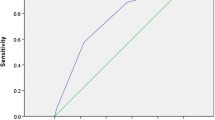Abstract
Objective: This study examined aspects of reliability, validity and utility of Addiction Severity Index (ASI) data as administered to clients with severe and persistent mental illness (SMI) and concurrent substance abuse disorders enrolled in a publicly-funded community mental health center. Methods: A total of 62 clients with SMI volunteered to participate in an interobserver and test-retest reliability study of the ASI. Spearman-Brown and Pearson correlation coefficients were calculated to examine the extent of agreement among client responses. Results: Overall 16% of the composite scores could not be calculated due to missing data and 31% of the clients misunderstood or confused items in at least one of the seven ASI domains. As a whole, the interobserver reliability of the ASI composite scores for those subjects where sufficient data were available was satisfactory. However, there was more variance in the stability of client responses, with four composite scores producing test-retest reliability coefficients below .65. Conclusion: Evidence from this study suggests that the ASI has a number of limitations in assessing the problems of clients with severe and persistent mental illness, and it is likely that other similar instruments based on the self-reports of persons with severe and persistent mental illness would also encounter these limitations.
Similar content being viewed by others
REFERENCES
Alterman, A.I., Brown, L., Zaballero, A., & McKay, J.R. (1994). The interviewer severity ratings and composite scores of the ASI: A further look. Drug and Alcohol Dependence, 34, 201-209.
Argeriou, M., McCarty, D., Mulvey, K., & Daley, M. (1994). Use of the Addiction Severity Index with Homeless Substance Abusers. Journal of Substance Abuse Treatment, 11, 359-365.
Bartko, J.J., & Carpenter, W.T. (1976). On the methods and theory of reliability. Journal of Nervous and Mental Disorders, 163, 307-317.
Corse, S.J., Herschinger, N.B., & Zanis, D.A. (1995). The use of the ASI with persons with severe mental illness: Face validity. Psychosocial Rehabilitation.
Cronbach, L. (1951). Coefficient alpha and the internal structure of tests. Psychometrika, 16, 297-334.
Fureman, I., McLellan, A.T., & Alterman, A. (1994). Training for and maintaining interviewer consistency with the ASI. Journal of Substance Abuse Treatment, 11, 233-237.
Drake, R.E., Alterman, A.I., Rosenberg, S.R. (1993). Detection of substance use disorders in severely mentally ill patients. Community Mental Health Journal, 29, 175-192.
Hodgins, D.C., & El-Guebaly, N. (1992). More data on the addiction severity index: Reliability and validity with the mentally ill substance abuser. Journal of Nervous and Mental Disorders, 180, 197-201.
Kosten, T.R., Rounsaville, B.J., & Kleber, H.D. (1983). Concurrent validity of the addiction severity index. Journal of Nervous and Mental Disorders, 171, 606-610.
McGahan, P., Griffith, J., & McLellan, A.T. (1984). Composite Scores from the Addiction Severity Index: Manual and computer software. Veterans Administration Press, PVAMC, Phila. PA 19104.
McLellan, A.T., Luborsky, L., Woody, G.E., & O'Brien, C.P. (1980). An improved diagnostic evaluation instrument for substance abuse patients: The addiction severity index. Journal of Nervous and Mental Disorders, 168, 26-33.
McLellan, A.T., Luborsky, L., Cacciola, J., Griffith, J., Evans, F., Barr, H.L., & O'Brien, C.P. (1985). New data from the addiction severity index: Reliability and validity in three centers. Journal of Nervous and Mental Disorders, 173, 412-422.
McLellan, A.T., Cacciola, J., Kushner, H., Peters, R., Smith, I., & Pettinati, H. (1992). The fifth edition of the addiction severity index: Historical critique and normative data. Journal of Substance Abuse Treatment, 9, 199-213.
Nunnally, J.C. Psychometric Theory. New York: McGraw-Hill, 1978.
Spitzer, R.L., Williams, J.B., Gibbon, M., & First, M.B. (1992). The structured clinical interview for DSM-III-R (SCID). 1: History, rationale, and description. Archieves of General Psychiatry, 49, 624-629.
Woody, G.E., McLellan, A.T., Luborsky, L., & O'Brien, C.P. (1985). Sociopathy and psychotherapy outcome. Archieves of General Psychiatry, 42, 1081-1086.
Woody, G.E., Luborsky, L., McLellan, A.T., & O'Brien, C.P. (1983). Psychotherapy for opiate addicts: Does it help? Archieves of. General. Psychiatry, 40, 639-645.
Zanis, D.A., McLellan, A.T., Cnaan, R., & Randall, M. (1994). Reliability and validity of the Addiction Severity Index in a homeless sample. Journal of Substance Abuse Treatment, 11, 541-548.
Author information
Authors and Affiliations
Rights and permissions
About this article
Cite this article
Zanis, D.A., McLellan, A.T. & Corse, S. Is the Addiction Severity Index a Reliable and Valid Assessment Instrument Among Clients with Severe and Persistent Mental Illness and Substance Abuse Disorders?. Community Ment Health J 33, 213–227 (1997). https://doi.org/10.1023/A:1025085310814
Issue Date:
DOI: https://doi.org/10.1023/A:1025085310814




